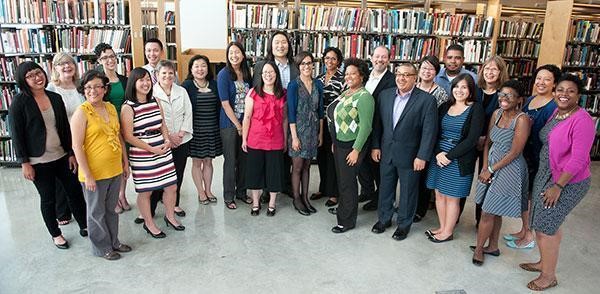by Jennifer Garrett, Michael Qiu and Jungwon Yang

Photo Credit: University of Minnesota Libraries
The Minnesota Institute for Early Career Librarians (MIECL) is an intensive, one-week professional development program intended for librarians from underrepresented groups in the first three years of their professional careers. Several APALA members attended the 2014 Institute last July and offered to share some of their takeaways in a series of web articles. This is the second installment in which Jennifer Garrett (North Carolina State University), Michael Qiu (University of Southern California), and Jungwon Yang (University of Michigan) discuss leadership, emotional intelligence, and organizational culture.
For part one in the series, please visit:
http://www.apalaweb.org/the-2014-mn-institute-for-early-career-librarian-a-cohort-of-support
We heard that Emotional Intelligence (EI) was one of main themes of the MIECL program. Does the knowledge of EI change your understanding of leadership and self-awareness? How do you apply EI in your workplace?
Jennifer Garrett (JG): As a new professional, applying the lens of Emotional Intelligence in how I understand myself, in addition to how I monitor the emotions of others, has made me a better leader and colleague. EI has become part of my toolbox and has truly changed how I interact with others in the workplace. An overarching focus of MIECL was to introduce tools and theories to help us better understand ourselves. Being knowledgeable of EI has made me more cognizant of my own emotions and how I label and discriminate between these emotions to others and myself. This is definitely difficult! However, I believe recognizing the difficulty involved in perceiving, reasoning, and managing emotions is a key component to being an effective leader.
Michael Qiu (MQ): As we learned about Emotional Intelligence, I developed a better understanding of the struggle individuals in leadership positions face with people from different backgrounds and experiences. We can all remember those leaders that we thought did a “good job” versus the ones that “struggled or did poorly.” I have a better appreciation for all of the struggles and issues they may have encountered trying to work with so many different individuals. After learning about EI, I now understand that leadership is not a task to be taken lightly and it can involve a balancing act of different emotions and people at any one time. The best leaders are able to take everyone’s strengths and best utilize those strengths for the advancement of the group, project, or unit. As an early career librarian, at my first professional position, learning the lay of the land and how my institution works is a challenge. Applying the concept of EI has allowed me to adapt to different situations more easily and better understand the individuals I am working with.
Recognizing the difficulty involved in perceiving, reasoning, and managing emotions is a key component to being an effective leader.
Jungwon Yang (JY): Before I attended the MIECL, I thought that leaders were people who had great willingness and vast knowledge to accomplish new ideas. But, this program showed me that performing emotional intelligence, in fact, was a pivotal element to be a good leader. In particular, it was a great discovery to me that social awareness — that is, understanding organizational culture and having empathy toward my colleagues’ feelings — was helpful for succeeding in my work performance as well as in group performance. Since I am working at a large-sized academic library, I often have a chance to work with colleagues from different units, which have different unit cultures. After the program, I found out that thinking about other people’s feelings and their own cultures made it a lot easier to work with them than before.
What were some of the major themes that emerged in your discussion of organizational culture and how have you integrated what you learned into your workplace practice?
JG: The discussion of organizational culture at MIECL was one of the most eye-opening of the week. In being asked to describe our organization’s culture to one another, this really helped make me more mindful of the uniqueness of my institution, while also appreciating the similarities that exist across organizations. Additionally, DeEtta used the iceberg metaphor to help us understand that the values and beliefs that make up the bulk of organizational culture, are often not visible from the surface. One of the main themes that emerged during this activity, is that we only learn to navigate these deeply held assumptions, over time. Following this discussion, I began to realize that I was largely navigating my organization’s unspoken characteristics without being as mindful of them as I should. Once I returned to work, I began drafting my personal and professional learning goals. Being able to place these goals in line with the seen and unseen culture of my organization has made me more successful.
MQ: I believe two major themes emerged in this discussion. The first is even though we think we are all different and unique, there are common, underlying issues that are present in every organization. So if organization x thinks they are the one and only going through a problem, I bet that there are at least another dozen organizations with the same problem. Whenever I have a problem, I know there are others I can consult and lean on who have been through the same situation. The second theme is that understanding organizational culture is important for understanding the implications when taking on new projects, roles, and/or positions. As we have new projects come up in the library, knowing the organizational culture has allowed me to step up and take charge of these projects. These new responsibilities help shape my career and prepare me for the future.
JY: As new librarians, we sometimes struggle with getting respect from our colleagues about our own ideas. During the discussion, we talked about how to resolve the problem in our organization. A useful lesson was that we needed to understand our own organizational cultures to communicate with our colleagues effectively. More importantly, even if our idea was not taken seriously by people right now, we learned that we did not need to be frustrated. Organizational culture is not static. It changes over time. So, our ideas can be adopted in the future when the issue emerges in a different way. As Pasteur said, “chance favors only the prepared mind.”
Editing assistance provided by Molly Higgins and Manlia Xiong.

